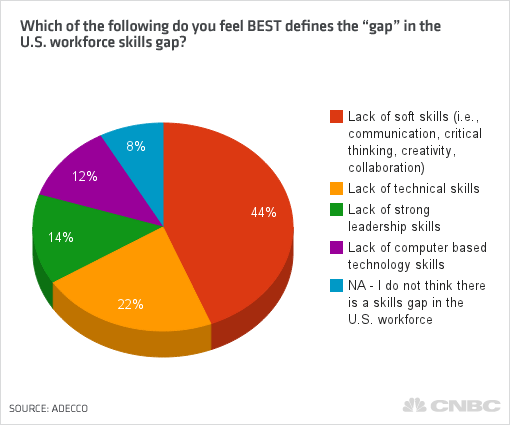By: Allen Wastler | Managing Editor, CNBC.com
What's more important for getting a job: Being able to write computer code or understanding what your boss says?
Either way, there's a problem, according to a recent telephone survey of 500 top executives.
Either way, there's a problem, according to a recent telephone survey of 500 top executives.

Ninety-two percent of them said there's a
job skills gap. And of that overwhelming majority, nearly half believed
the gap was in "soft skills"—communication, critical thinking,
creativity and collaboration.
"Many of them are saying they are getting applicants who aren't prepared for the workplace," said Janette Marx, senior vice president of Adecco Staffing US, which conducted the survey.
The job skills gap has been an ongoing subject of controversy. The idea is that while unemployment is high, many jobs remain unfilled because American workers don't have the skills to fill them. Critics dispute this idea, arguing that if Corporate America simply upped the pay scale, and stopped trying to import cheap foreign labor through various visa programs, those jobs would be filled.
"Many of them are saying they are getting applicants who aren't prepared for the workplace," said Janette Marx, senior vice president of Adecco Staffing US, which conducted the survey.
The job skills gap has been an ongoing subject of controversy. The idea is that while unemployment is high, many jobs remain unfilled because American workers don't have the skills to fill them. Critics dispute this idea, arguing that if Corporate America simply upped the pay scale, and stopped trying to import cheap foreign labor through various visa programs, those jobs would be filled.
So the soft skills section of the survey is particularly worrisome. Sure, some companies may be hurting because they can't find the right technical help, but a lot more will suffer if they can't find people with basic communication skills.
"On how serious is the skills gap ... well, that has several dimensions," said Gary Beach, author of "The US Technology Skills Gap." "Most of the data, like the Adecco survey, focus on the 'current' situation. Based on the incredibly poor results for U.S., 15-year-old students in the latest PISA test results, I worry much more about the 'future'—out 10 to 15 years—skills gap crisis."
And how do you fix that? Well, that's the second part of the job skills gap debate: How do you teach the right skills gap, and who pays for it? This typically boils down to a government education versus private business training fight.
Indeed, more than half of the respondents in the Adecco survey said they didn't think the U.S. college system was doing a good job of preparing students for the workplace. And the vast majority, 89 percent, thought corporate training programs and apprenticeships were the way to go to fill the job skills gap. Of course, a good chunk of those executives believe the cost of developing in-house training programs was a major barrier.
"Our survey showed they feel the need is there, but they also feel constrained by the cost factor," Marx said. "But if they don't, business will miss some opportunities."

No comments:
Post a Comment